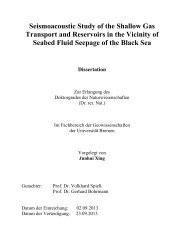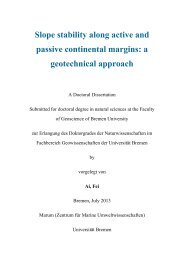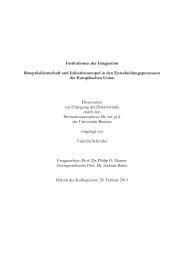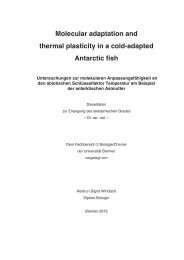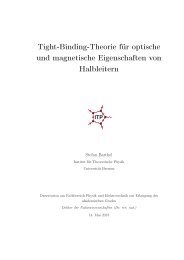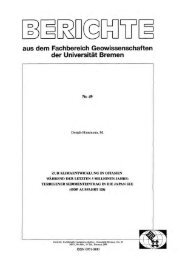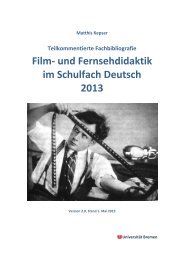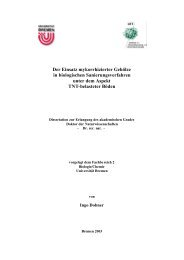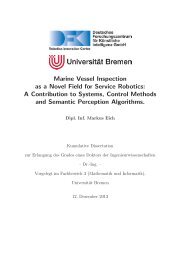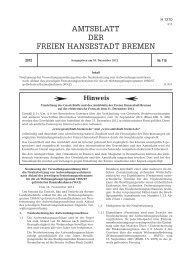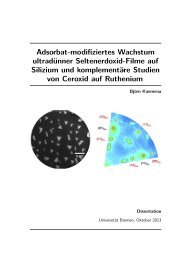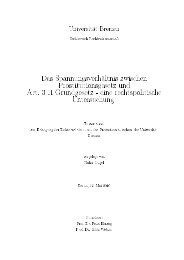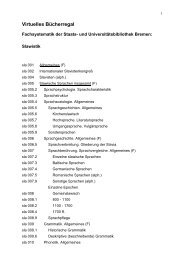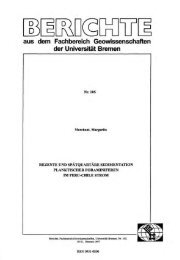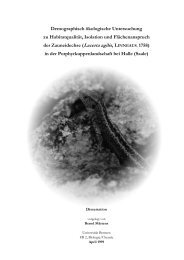Hiske Gesine Fink - E-LIB - Universität Bremen
Hiske Gesine Fink - E-LIB - Universität Bremen
Hiske Gesine Fink - E-LIB - Universität Bremen
You also want an ePaper? Increase the reach of your titles
YUMPU automatically turns print PDFs into web optimized ePapers that Google loves.
� � ��������������������������������������������<br />
7 Cold�water�coral�growth�in�the�Alboran�Sea�triggered�by�high�productivity�<br />
during�the�Late�Pleistocene�and�Holocene�<br />
<strong>Hiske</strong>�G.�<strong>Fink</strong>������������������������������������������������������������������� ������������������� �<br />
1MARUM���Center�for�Marine�Environmental�Sciences,�University�of�<strong>Bremen</strong>,�Leobener�Strasse,�28359�<strong>Bremen</strong>,�Germany�<br />
2Earth�System�Science�Department,�B321�Croul�Hall,�University�of�California,�Irvine,�California�92697,�USA�<br />
3present�address:�Departamento�de�Oceanografía,�Universidad�de�Concepción,�Barrio�Universitario�s/n,�Chile�<br />
�<br />
�������������Marine�Geology��������������<br />
�<br />
Cold�water�corals�are�common�along�the�Moroccan�continental�margin�off�Melilla�in�the�<br />
Alboran� Sea� (western� Mediterranean� Sea),� where� they� colonise� and� even� built� substantial�<br />
mound�and�ridge�structures.�Radiocarbon�ages�of�the�two�reef�forming�coral�species�Lophelia�<br />
pertusa� and� Madrepora� oculata� revealed� that� they� were� prolific� in� the� area� during� the� last�<br />
glacial�interglacial� transition� with� pronounced� growth� periods� covering� the� Bølling�Allerød�<br />
interstadial�(13.5�12.9�ka,�and�probably�before)�and�the�Early�Holocene�(11.2�9.6�ka).�Their�<br />
proliferation�during�the�Early�Holocene�is�expressed�in�impressive�vertical�growth�rates�for�<br />
an� individual� coral� ridge� of� 230�265� cm� ka�1� that� consists� of� coral� fragments� embedded� in�<br />
hemipelagic� sediment� matrix.� Following� a� period� of� coral� absence,� cold�water� corals� re�<br />
colonised�the�area�during�the�Mid�Holocene�(5.4�ka)�and�thrive�there�until�today.�It�appears�<br />
that� periods� of� sustained� cold�water� coral� growth� in� the� Melilla� Coral� Province� are� closely�<br />
linked� to� phases� of� high� marine� productivity.� Those� phases� were� related� to� the� deglacial�<br />
formation�of�the�most�recent�organic�rich�layer�(ORL1)�in�the�western�Mediterranean�Sea�and�<br />
the�development�of�modern�circulation�patterns�in�the�Alboran�Sea.�<br />
�<br />
Key�words:����������������������������������������������������������������������������������<br />
�������������<br />
��� ��������������<br />
����������� ������� ����� ������� ����<br />
������������� ����������� ������ ���� ��������<br />
������������ �������� �Roberts� et� al.,� 2006��� �����<br />
��� ���� ����������� ���������� ��� ����������� ������<br />
���������������������������������������������<br />
���������� ��������� �Roberts� et� al.,� 2006��� ������<br />
����� ����� ������� ������ ��� �������� �����������<br />
������� �Freiwald� et� al.,� 1997;� Fosså� et� al.,� 2005��<br />
�����������������������������������������������<br />
������� �Kenyon� et� al.,� 2003;� Mienis� et� al.,� 2007;�<br />
Wheeler� et� al.,� 2007��� ���� ����� ���������� �����<br />
�������� �������������� ����������� ������ ��������<br />
���� Lophelia� pertusa� ����Madrepora� oculata�<br />
�Freiwald� et� al.,� 2004��� ����� �����������<br />
����������� ��� ������ ��� ������ ����� �����������<br />
����� ����� ���������� ���� ������� ������������ ���<br />
L.�pertusa�����������������������������������������<br />
�������Roberts�et�al.,�2006;�Freiwald�et�al.,�2009���<br />
�������������������������������������Freiwald�et�<br />
al.,� 2004;� Davies� et� al.,� 2008�� ���� ��� �������<br />
��������� ��� ��������������� �Davies� et� al.,� 2008���<br />
���������� ����������� ������� ���� ��������<br />
� � ���



